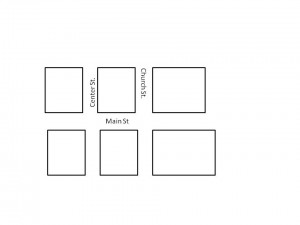 There is a lot of discussion these days about ‘buying local’. There is even a national organization with chapters which promotes it (along with a lot of other local initiatives) Local Economies . American Express just sponsored, for the second year, a national event called “Small Business Saturday” to encourage people to buy with small businesses (not only local; and as an incentive, they offered a credit off the customer’s bill for buying at a small business).
There is a lot of discussion these days about ‘buying local’. There is even a national organization with chapters which promotes it (along with a lot of other local initiatives) Local Economies . American Express just sponsored, for the second year, a national event called “Small Business Saturday” to encourage people to buy with small businesses (not only local; and as an incentive, they offered a credit off the customer’s bill for buying at a small business).
But, when it comes time for us, as consumers, to actually find local businesses, it might not be so easy. Up through the 1970s, most cities of any size had ‘downtown’, which was usually filled with small, locally-owned businesses. If you wanted something else, or bigger names, or certain products, you traveled elsewhere. When I was growing up, anyone who wanted something other than what was on offer in our little stores and the locally-owned department store (which, looking back, was actually quite wonderful and carried everything from china and glassware in the basement to ladies hats, fabrics and patterns, clothing from infant sizes on up, and they even had a formidable lady in a black dress with a measuring tape around her neck who would take you discretely into the dressing room and measure you up to fit you for brassieres) drove to the next biggest city, about 30 miles away, that had at least 3 much larger, locally owned department stores plus hundreds of other smaller shops in THEIR downtown.
And then came malls. And national chains. Everyone thought that going out to the mall to shop was a big deal and the prices were ‘so much better’, and downtowns in most places just crashed, though some places managed to maintain a kernal of a downtown (especially if there were commercial businesses with employees who needed a drugstore, dry cleaners, banks, restaurants and so on for the lunch hour). In some places, those small hubs have acted as the ‘tent poles’ for other small businesses which have sheltered next to them. Sometimes those small businesses form organizations and do events and programming to get people to come downtown on a regular basis in the hope that once people re-discover what is actually downtown, they just might find that shopping in those small places is actually more interesting than going to the mall.
(Public admission here: Aunt Toby HATES to shop at malls; with the consolidation in the retail industry, every department store seems to carry exactly the same brands and lines within the brands. The merchandise seems, to my eye, to be universally tatty and no one bothers to have enough help in the stores or to train the help in the stores. No one working the floor knows what they have or don’t have; I’ve always felt that the question posed at the cashier’s desk, “Has anyone helped you today?” is an attempt at irony)
But, when you want to ‘go local’, how do you find local shops, stores and businesses? I realize this sounds like what my kids used to refer to as ‘a no duh’ but think about it. With the fracturing of retail and the evisceration of downtowns, how do we find local stores and shops?
Easy methods:
Always start with what you know. If you have one of the ‘shop local’ organizations, check their website. They will have a listing of their members and use that as your foundation. Unfortunately, not everyone will be a member. How do you find the rest?
If you do have shopping districts in your area, drive there and walk around. Take friends and family with you to break up the job. If you really want to perform a public service, take a big pad of paper and write the businesses’ names, what you see in the windows and the address down. If you feel like a creative type, make a diagram like the one below and fill it in. And, don’t forget to look above the first floor – who knows what little atelier or office is upstairs. 
More Work
But that’s not all. You know and I know that there are a lot of people who have businesses that they operate out of their homes and farms. To find those folks, you will need to do more digging. If you have a farmers market (and many are now year round or do special holiday ‘winter markets’), visit the market or find the market contact info and ask the market manager. If you are able to visit the market, ask the people AT the market; take down their information and explain that you are collecting information about anyone you can find who has a little business, makes things for sale and so on. I can tell you from my experience at our local farmers market that for every vendor who is actually there, there are at least 3 more who viewed themselves as too small to take a booth. If you can find those people, your list will get larger and larger.
Another source of small local businesses information is to ask co-workers and friends. “Do you know anyone who is doing a little business at home? Do you know anyone who makes children’s wooden toys? Do you know anyone who is making dolls? Do you know anyone who does ceramics and sells? Do you know anyone who does custom clothing or underwear? Anyone who does specialty clothing for people with special needs? Is there anyone you know with an interesting hobby?” The list of items grows and grows. We have a museum locally which has a lovely shop. That’s a local business. That museum also has a ceramics studio and the people who take classes there and use the facility also hold a big sale several times a year; THAT’s a small local business too.
One of the sad reasons why people shop at malls is that they know that shopping is there. One of the really sad reasons why people do NOT shop locally is that they don’t know what else is out there or where it is. If you go through this process, you will have a terrific idea of what is happening in your community and who is doing what. So, what do you do with THIS info? First thing I’d do is contact the local ‘buy local’ organization and ask if they want to publish your list. They might – or they might just want to use it to try to get the businesses to join their organization. All well and good. But one thing you CAN do with it, to be frank, is to make a Facebook page with it and call the page something truly obvious, like “(Your town or county name) local businesses” so that if someone searches on the internet for just that thing, they will be alerted to it.
Yes, this is work; I have to admit that. Getting out and driving and walking around, writing down names, asking people for information is a big job. I’m sure there are some readers who are saying to themselves, “This is the job of the local economic development people (or, the downtown business development association, or whatever group you’ve got if you’ve got one); why should we, as community people volunteer our time to perform what is basically a marketing and advertising function?” Let’s put it this way: We will never be able to break the cycle of ‘autopilot shopping at the mall or ‘big box store’/never go downtown or to a small business’ if we don’t get information out there to let people know that there are actually alternatives. It’s a really good deed that you can do for your community. There are literally thousands of small towns and cities in this country which, through the ‘Wal-martization’ of America have lost entire business districts. In some places, the loss of just one core store, such as a department store or the town grocery store has led to the death of the entire downtown, which led to people doing all of their shopping far away, which led to the spiritual death of the entire community. Having a core of small, locally-owned businesses if important to our communities and we need to nurture them.
But we can’t help if we don’t know what’s out there.
(photo of downtown Madison, Wisconsin by Jeffmarks.net)

Toby, if people want to shop locally, they might park their cars and walk around to look at what is in a given neighbourhood. They could pick up community newspapers or check online local business association sites, which offer very low cost or free advertising to local businesses.
I have long sought out and championed local designers for clothes and home decor. They tend to occupy non-prime locations, so that has meant prowling halls of semi-decrepit industrial lofts or nosing around in the low-rent parts of my city. Or I go to craft or art shows, where young or indy designers can afford a table. Many times the quality of workmanship is no better than the department-store brands you castigate, because they are learning their craft and often cannot afford the best materials- but every once in awhile a gem turns up.
For local produce and comestibles, we have fabulous food markets here in Montreal.
Another, easy place to look is in your local craigslist. I found a yarn spinner that way, right in my tiny town. Also, our library has a bulletin board where local businesses often post.